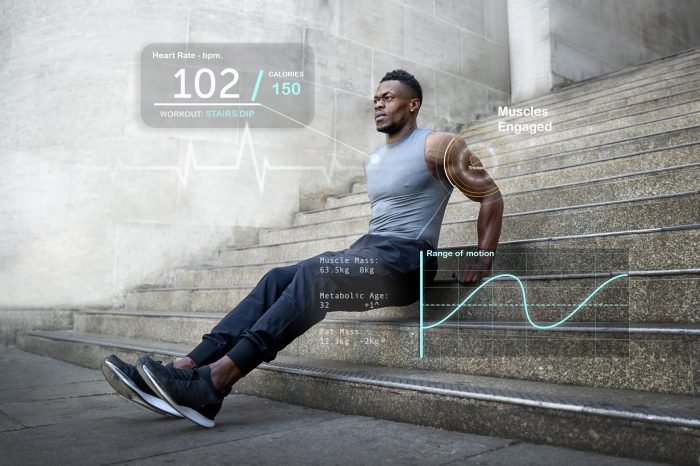Exploring the realm of AI-Powered Fitness: The Future of Digital Health Lifestyles unveils a fascinating landscape where cutting-edge technology intertwines with personal wellness goals. As we delve into the impact of AI on the fitness industry and the myriad benefits it brings to our daily routines, a new era of health and well-being emerges.
Let's embark on a journey that redefines how we approach fitness and health in the digital age.
Introduction to AI-Powered Fitness

AI-powered fitness refers to the integration of artificial intelligence technology into digital health lifestyles to enhance and optimize fitness routines. By leveraging AI algorithms and data analysis, individuals can receive personalized workout plans, nutrition recommendations, and real-time feedback to achieve their health and fitness goals.
The Role of AI in Transforming the Fitness Industry
- AI enables the collection and analysis of large amounts of data, allowing for more accurate and personalized fitness recommendations.
- AI-powered fitness apps and devices can track progress, provide motivation, and adapt workout plans based on individual performance.
- AI algorithms can predict potential health issues and offer preventive measures to improve overall well-being.
The Benefits of Incorporating AI into Fitness Routines
- Personalized workout plans tailored to individual goals, preferences, and fitness levels.
- Real-time feedback and performance analysis to optimize workouts and prevent injuries.
- Enhanced motivation and engagement through interactive AI features and gamification elements.
- Improved overall health outcomes and well-being through targeted nutrition recommendations and lifestyle adjustments.
AI-Powered Fitness Apps and Devices

AI-powered fitness apps and devices are revolutionizing the way people approach their health and wellness goals. These innovative tools utilize artificial intelligence algorithms to provide personalized workout plans, nutrition recommendations, and real-time feedback to users.
Popular AI-Powered Fitness Apps and Devices
- Fitbit: Fitbit offers AI-powered features such as personalized workout suggestions based on user activity and sleep patterns.
- MyFitnessPal: This app uses AI algorithms to analyze user data and provide customized meal plans and calorie tracking.
- Peloton: Peloton's AI technology adjusts workout intensity and provides live feedback during classes for a tailored experience.
Comparison of AI-Powered Fitness Apps with Traditional Fitness Apps
- AI-powered fitness apps offer personalized recommendations based on individual data, whereas traditional apps provide generic workout plans.
- AI algorithms in fitness apps adapt to user progress and preferences, while traditional apps may not adjust to user feedback.
- AI-powered apps use machine learning to continuously improve recommendations, whereas traditional apps may not have the same level of adaptability.
Personalized Fitness Recommendations with AI Algorithms
AI algorithms in fitness apps collect and analyze user data, including activity levels, sleep patterns, and nutrition habits, to generate personalized recommendations. These recommendations are tailored to each user's goals, preferences, and progress, ensuring a more effective and engaging fitness experience.
Data Analytics in AI-Powered Fitness
Data analytics is a critical component of AI-powered fitness solutions, allowing for the collection, processing, and analysis of vast amounts of user data to provide personalized insights and recommendations for improved health outcomes.
Types of Data Collected by AI-Powered Fitness Devices
- Biometric data such as heart rate, sleep patterns, and activity levels
- Exercise performance metrics like repetitions, duration, and intensity
- Dietary information including calorie intake, macronutrient breakdown, and hydration levels
- Environmental factors such as temperature, humidity, and air quality
How AI Analyzes User Data for Better Health Outcomes
- Pattern recognition: AI algorithms can analyze trends in user data to identify patterns and correlations that may impact health and fitness goals.
- Personalized recommendations: By leveraging data analytics, AI can offer customized workout plans, nutrition advice, and lifestyle changes tailored to individual needs.
- Predictive insights: AI can predict potential health risks or performance improvements based on data analysis, enabling users to take proactive measures for better health outcomes.
Virtual Trainers and Personalized Workouts
AI technology plays a crucial role in enabling virtual trainers within fitness apps, providing users with personalized workout plans tailored to their specific preferences and goals. This customization not only enhances the user experience but also significantly impacts user engagement and motivation.
AI-Enabled Virtual Trainers
AI algorithms analyze user data such as fitness level, workout history, and health goals to create personalized workout plans. Virtual trainers can offer real-time feedback, track progress, and adjust routines as needed. By simulating a one-on-one training experience, these virtual trainers provide guidance and support to users anytime, anywhere.
Customized Workout Plans
AI technology can adapt workout plans based on user feedback, performance metrics, and changing goals. For example, if a user prefers cardio over strength training, the AI can prioritize cardio exercises in their routine. By considering individual preferences and capabilities, AI ensures that workouts are challenging yet achievable, keeping users motivated to achieve their fitness goals.
Impact on User Engagement and Motivation
Personalized workouts generated by AI help maintain user engagement by preventing monotony and boredom. When users see progress and receive tailored recommendations, they are more likely to stay committed to their fitness journey. The sense of accomplishment and continuous improvement provided by personalized workouts boosts motivation, leading to better adherence to exercise routines and overall satisfaction with the fitness app experience.
AI and Wearable Fitness Technology
AI integration in wearable fitness technology has revolutionized the way people track and improve their health and fitness goals. By combining artificial intelligence with wearable devices, individuals can now access real-time data, personalized insights, and tailored recommendations to enhance their overall well-being.
Advantages of Wearable Devices Equipped with AI
- Accurate Fitness Tracking: AI-powered wearables can monitor various metrics such as heart rate, steps taken, calories burned, and even sleep patterns with high precision.
- Personalized Recommendations: With the help of AI algorithms, wearable devices can analyze the collected data and provide customized workout plans, nutrition advice, and reminders to keep users motivated and on track.
- Real-Time Feedback: Wearable fitness technology equipped with AI can offer immediate feedback during workouts, helping users make adjustments to their form, intensity, or duration to optimize performance and prevent injuries.
Contribution to Holistic Digital Health Lifestyles
- Comprehensive Health Monitoring: AI-powered wearables enable users to monitor not only physical activity but also stress levels, hydration, and overall health status, promoting a holistic approach to well-being.
- Behavioral Insights: By analyzing user behavior patterns, AI can identify trends, habits, and areas for improvement, empowering individuals to make informed decisions for long-term health and fitness goals.
- Enhanced Motivation: The personalized nature of AI-powered wearables, coupled with gamification elements and social integration, can boost motivation, engagement, and adherence to healthy lifestyle changes.
Challenges and Ethical Considerations
When it comes to AI-powered fitness, there are various challenges and ethical considerations that need to be addressed in order to ensure the well-being and privacy of users.
Data Privacy Concerns
One of the major challenges associated with AI-powered fitness is the issue of data privacy. With the collection of sensitive health and fitness data, there is a risk of this information being misused or falling into the wrong hands. It is crucial for companies developing AI-powered fitness technologies to implement robust security measures to protect user data from breaches and unauthorized access.
Ethical Considerations in Personal Health and Fitness
The use of AI in personal health and fitness raises ethical concerns surrounding autonomy, consent, and accountability. There is a need to ensure that individuals have full control over their personal data and the insights derived from AI algorithms. Additionally, transparency in how AI technologies operate and make decisions is essential to maintain trust and accountability in the health and fitness industry.
Strategies to Address Ethical Dilemmas
To address potential ethical dilemmas in AI-powered fitness technologies, companies can implement strategies such as obtaining explicit consent from users before collecting data, providing clear and accessible privacy policies, and allowing users to easily opt-out of data sharing. Moreover, incorporating ethical guidelines into the design and development process of AI technologies can help promote responsible and ethical use of these tools in the health and fitness sector.
Final Conclusion
In conclusion, AI-Powered Fitness: The Future of Digital Health Lifestyles represents a revolution in how we perceive and engage with our well-being. By harnessing the power of AI, we pave the way for a future where personalized fitness experiences and data-driven insights shape a healthier tomorrow.
FAQ Guide
How does AI personalize fitness recommendations?
AI algorithms analyze user data, such as workout history and preferences, to tailor fitness recommendations that align with individual goals and needs.
What types of data do AI-powered fitness devices collect?
AI-powered fitness devices collect various data points like heart rate, activity levels, sleep patterns, and exercise routines to provide comprehensive insights for users.
What are some ethical considerations in AI-powered fitness?
Ethical considerations include issues related to data privacy, consent, and ensuring that AI technology is used responsibly to improve user well-being without compromising privacy.



